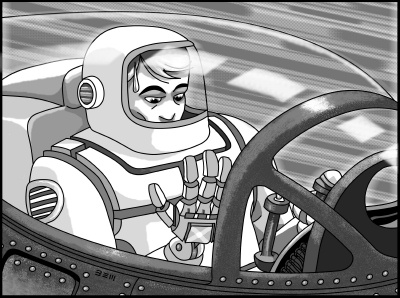The Strange and Curious Tales of Carl E Reed

I suppose I should kick off with a disclaimer. I’ve known Carl Reed since before I was professionally published in fiction.
I met him years ago, somewhere in the crazy 90s, when the dot-coms still had mercury-winged, lavishly-financed feet. I’d plopped down in the Arlington Heights Barnes and Noble to work on my draft and I saw a bearded man, near my own age and size, but a little broader, wearing a leather biker’s hat, pen in hand, peering at some handwritten words in a spiral notebook with equal parts concentration, wonder, and grief.
Yup, I thought. Has to be a writer. So I struck up a conversation and, in ten minutes, I felt I’d found a friend. I had discovered a man who takes pleasure in good reading and wants others to experience the same, a self-taught sage who puts each and every graduate-degreed friend of mine to shame with his scope of knowledge (living proof of the Good Will Hunting thesis that all you need for an education is a library card). Carl’s a skeptical iconoclast who currently works for the Jesuits in a publishing house. The Jesuits, no intellectual couch-potatoes themselves, probably admire his disciplined and rigorously-exercised mind.
We’ve drifted in and out of Chicago-area suburban writer’s groups and events. Even though my chosen arena of the writing world is the novel and he likes the fencing piste of the short story, we each found interesting aspects in the other’s writing and shared many a profitable critique session. Carl’s been published a few times (including in the old paper Black Gate with “The Final Flight of Major Havoc” in #9 “A tiny gem” -Lisa DuMond, SF Site), and in some ways, his successes are more noteworthy than mine, just because it’s so wretchedly hard to get any recognition as a short fiction writer.
How many short fiction guys who dabble in Sword and Sorcery have been featured on NPR? Yeah. That’s the mountain Carl climbed.
I’m not surprised he’s attracted that kind of notice. His weird fiction is a blend of Bradbury, Dick, Serling, Lovecraft, often with a bloody dash of Howard, all couched in a careful prose that might have come from Umberto Eco or Arturo Perez-Reverte.
Like most writers, Carl Reed has a hatful of favorite themes. He enjoys stories of survivors of another age, lost in the wrong era, shuffling about in mufti until forced to reveal themselves by circumstance. Civilization and savagery are often involved, and Carl isn’t satisfied with easy answers about either. He also likes creating a pleasant, family dinner table veneer and then peeling back the wallpaper to show rot and horror beneath. People haunted by their sins, both old and wetly fresh, also feature in more than one of his pieces. If he has a fault, it’s when he reaches too hard for a twist ending. I think his best work builds from the first paragraph, when he reveals the story rather than conceals, but it may just be taste.
Many (but not all, hurry up, Carl!) of Reed’s remarkable stories are available through Amazon’s Kindle, I’m happy to say. You can buy the complete collection for less than the price of an extra-value meal, so get the batch. I’d like to point out a few that deserve special attention:
“Come Haltingly on Lame Feet”- this story features all of Reed’s strong points. My compass sometimes wanders as to which story of his is my favorite, but right now this is it. The reader gets to enjoy a character lost in time, mythic symbols out of both history and Jung, and a confrontation that neither flinches from nor wallows in its violence. A twelve-year-old who is just now exploring the written word outside of comic books and a Professor of Philosophy would both find something to enjoy in this piece.
“The Man Who Killed William Shakespeare” – there’s a bit of an imp in Reed. He likes to poke the pretentious and self-satisfied, and this tragedy-as-madcap time-travel story shows off his sly wit. Every bit as good as H.Beam Piper’s classic Paratime tales, this one makes me wish Star Trek had hired Reed to do their technobabble: he’s much better at it. It does require a reread to fully appreciate it, however.
“The Strange And Curious Tale of Professor R.H. Wilson” – Professor Wilson is my favorite of Carl’s characters. He deserves to be seen again, perhaps in some larger tale. He seems to me ideally suited, like the young Indiana Jones, to encounter a few familiar cultural and world-historical figures and shed some light on dark incidents of history. Sorry to resort to publicly urging you, Carl. Be warned, Mr. Reed really lets slip the wine-colored hounds of ornate word-smithery here. This is the Hallelujah Chorus of Rugose Reed Prose Style, and all the more delightful for it.